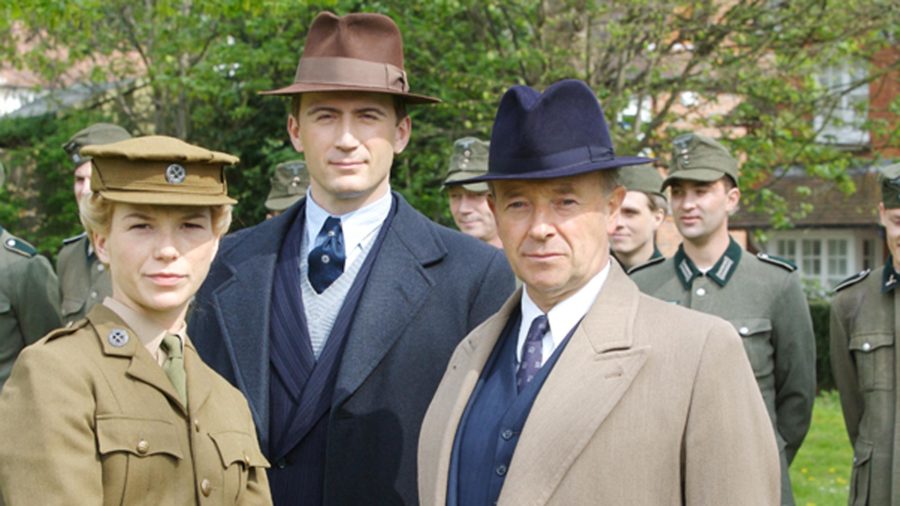Foyle’s War This is the most unhurried of shows. No theatrics or explosive drama, just quietly understated performances and solidly written episodes. And all of it underscored by the oh-so-subtle and muted performance of Michael Kitchen who brilliantly plays the title character. Inspector Foyle is the master of the arched brow, twitch of the mouth and fleeting smile of mock surprise, expressing so much of what he has to say while saying nothing at all. And then — the dry zinger of a comment that puts someone firmly in their place. Foyle is a police officer in the seaside town of Hastings on the southern coast of England during World War Two. A widower, he has a son, Andrew, who is a pilot in the RAF. Foyle would like nothing better than to do his bit and sign up for duty but is not allowed. He, alas, finds himself stuck on the home front, where, despite the war swirling around, or sometimes because of it, the crooks are still being crooked and the murderers are still committing murder. And Foyle is determined to bring every last one of them to justice. Helping him with his enquiries are Sergeant Paul Milner, also of a quiet and reserved nature, and Sam, his driver, who is not. Sam, a modern young woman, brings a nice bit of life and quirky energy to the trio. Foyle is a tirelessly honourable and upstanding man who never waivers from the truth throughout all the nuances that war brings. Storylines deal with the typical, and sometimes not so typical, wartime issues of black market dealing, corrupt officials and nazi spies as well as social issues of the time such as homophobia and racism. The show is rich in historical detail with some episodes focusing on little known events that can be really interesting if you’re a history buff. Some might find this show to be a bit slow and ploddy but it has always been one of my favourites and clearly it was for a lot of other people too. It was cancelled after series four, in fact the producer hurried the timeline considerably, with 8-9 months between episodes during season five, in order to reach the end of the war. But due to popular demand it was brought back and so the final 3 seasons deal with post-war and Cold War issues. Season eight was supposedly its last, but the final episode seemed to contain the slightest suggestion of more to come. I certainly hope so.
George Gently I have a thing for voices. And Martin Shaw, who plays Inspector George Gently, has a great one — it’s a deep, sexy rumble of a voice. Voices don’t get much better than this, in fact. Honeyed, dulcet tones with hints of dignity and undercurrents of respect. Ahhh, but I digress. George Gently is set up north in the Geordie environs of Newcastle. The inspector, a former Scotland Yard detective, leaves London after the death of his wife and is teamed up with Sergeant John Bacchus (Lee Ingleby, who is always excellent), a racist, arrogant, misogynstic pimple of a man. The complete opposite of his superior in fact. Gently, like Foyle, is a good old fashioned cop, straightforward and honest, who believes strongly in arriving at the truth without breaking the law. Bacchus on the other hand is impulsive and holds no such qualms. The two have something of a prickly relationship but over time they play nicely off one another. Gently seems to regard his cohort as an overgrown puppy who just needs to be brought to heel. Bacchus, for his part, appears to mature as the years progress. The series is set in the 1960’s in the bad old days of policing and a lot of the storylines revolve around corruption or just the plain heavy handedness of coppers and their sexist and racist views of the world — a world entirely devoid of political correctness. For his part, Inspector Gently does not suffer fools gladly and being much more liberal than most of his colleagues, takes a decidedly paternalistic approach with many people who cross his path, especially those such as prostitutes and abused wives.
The Bletchley Circle This begins during WWII with four women who have just cracked a code which ultimately saves lives and shortens the duration of the war. Nine years on, we find ourselves catching up with this group’s lead character, Susan, now slogging through the far less intriguing life of a housewife in post-war England. She is knitting and watching the clock. She goes to the shops, her children come home from school. In the background a radio talks of dead bodies which have been found. Susan, whose brilliance with patterns landed her at Bletchley, has noticed a pattern in the deaths of these women and the latest body find doesn’t fit. Convinced that there is an as yet unfound body, she persuades her husband to set up an appointment with the deputy police commissioner whom he happened to know during the war. A search takes place but is unsuccessful. Aware of her disappointment, Susan’s husband says to her, ” I’ll buy you a new book of puzzles. I’ll buy you the hardest puzzles I can find.” He kisses her goodbye as she hands him his briefcase and he heads out the door, leaving Susan with a tight smile on her face. It’s a telling scene. We know what Susan accomplished during the war. Due to the Officials Secret Act, her husband does not. Undeterred, Susan rounds up her wartime pals and is determined to accomplish what the police cannot. Everyone takes a little convincing but when another woman goes missing they know they need to crack this case before someone else loses her life. What follows is a steady and methodical solving of the crime. But while the solving of the murders is at the heart of this show, what really makes it engaging is the window it opens on the lives of women in the 1940’s and 50’s. These are smart, capable women who were able to contribute enormously to the war effort, but afterwards were expected to return home and take up traditional roles of wives and mothers. Susan’s chafing at these constraints is palpable. She is bored and frustrated and in desperate need of something to sink her teeth into. Well written and superbly acted it was inexplicably cancelled after just two seasons. Too many shows with smart women on TV I guess.



Be First to Comment